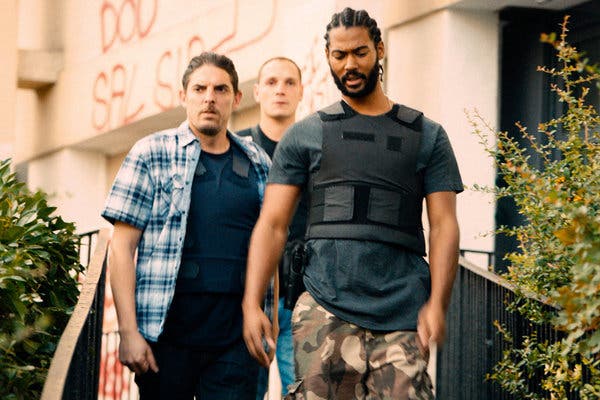Film Review: “Les Misérables” — Nobody is Safe
By Peg Aloi
Les Misérables invites us to ponder, in real time, how people respond in a chaotic, dangerous situation.
Les Misérables, directed by Ladj Ly. Screening at Kendell Square Cinema, Coolidge Corner Theatre, and AMC Boston Common 19.

From left, Damien Bonnard, Alexis Manenti, and Djebril Zonga in “Les Misérables.” Credit: Amazon Studios.
This powerful feature debut from filmmaker Ladj Ly is a high-octane thriller set in the streets of Paris. The district of Montfermeil, where Victor Hugo wrote the famous eponymous novel, is now an impoverished suburb of France’s biggest and richest city. A young police officer moves there from the provinces, to be closer to his son. Brigadier Stéphane Ruiz (Damien Bonnard) is quiet and unassuming. He is paired with more experienced police officers in a crime prevention unit so that he can learn about the new neighborhood he’ll be working in. The mentors he is assigned to work with, Chris (Alexis Manenti) and Gwada (Djibril Zonga), are both somewhat cocky. But whereas Chris, a white officer, is determined to bend rules and belittle area residents who annoy him, Gwada is more compassionate, his street savvy borne of his own French-African heritage.
Chris and Gwada tease Stéphane at first, assuming his quiet ways and lack of arrogance mean he may not be tough enough for the job. But Stéphane is watching and observing, trying to absorb what he needs to know. On their first day together the team experience some trouble with a local group of teenagers who are fed up with what they claim to be police brutality directed at their community. The boys are mostly poor, and doing what bored kids do: getting into trouble. They fancy themselves a gang of sorts, but don’t have the rituals or trappings to solidify their quest for this identity. A local mosque and its community leaders try to encourage the boys to engage in more wholesome behavior, offering them snacks and kind words.
There is a recent score to settle. The boys have their eyes on the cops as a way to revenge wrongs done to one of their friends. The aggression and ingenuity of these teens as they execute an assault, without weapons or tactical gear, on the cops is rather imposing to behold. The police find themselves trapped in a vacant building. Despite their orders not to use firearms, the officers uses various tools that are intended to neutralize physical threats. A teenage boy is injured by Chris’s too-hasty use of a powder pistol; it is a screw-up that could lose Chris his job and generate media scrutiny. Chris and Gwada are determined to cover up what happened. Layers of tension and conflict are created by the ensuing fallout: black versus white, Muslim versus Christian, police versus civilians.
Stéphane is insistent that his comrades do the right thing. His quiet demeanor as a new guy on the team is replaced by a fervent empathy matched by an assertive determination to not make matters worse than they are. He immediately tries to get the boy some medical attention, but he is thwarted by Chris (a reminder for Americans that victims of police violence are sometimes left to bleed to death while officers trained in first aid stand by). When Chris and Gwada learn that another neighborhood boy, who is not part of the group, recorded the incident inadvertently with a drone, they have a new challenge: to track down the footage at all costs. Tensions escalate as Stéphane’s commitment to do the right thing clashes with Chris’s desperate efforts to avoid censure. Meanwhile, Gwada is caught in the middle. He is a longtime participant in the low-level police corruption, but was also a victim of the sort of racism Chris levels at the neighborhood residents.
Les Misérables is not an easy film to watch. The cast is first rate, utterly believable, and the action is a thumping adrenaline rush, delivered in cinema verité style. Praise should go to the young actors, many of whom are making their film debuts in a narrative that must have been a rather harrowing emotional experience. The suspense and excitement is raw and plausible, implicating us as witnesses. The film invites us to ponder our possible responses in a chaotic, dangerous situation. Police brutality is a fact of life, but so is youth violence. Les Misérables chronicles what happens when efforts made to address volatile issues at their starting points (racism, poverty, entitlement, patriarchy) have been too little and too late.
Peg Aloi is a former film critic for The Boston Phoenix and member of the Boston Society of Film Critics. She taught film studies in Boston for over a decade. She writes on film, TV, and culture for web publications like Vice, Polygon, Bustle, Mic, The Orlando Weekly, Crooked Marquee, and Bloody Disgusting. Her blog “The Witching Hour” can be found at themediawitch.com.
